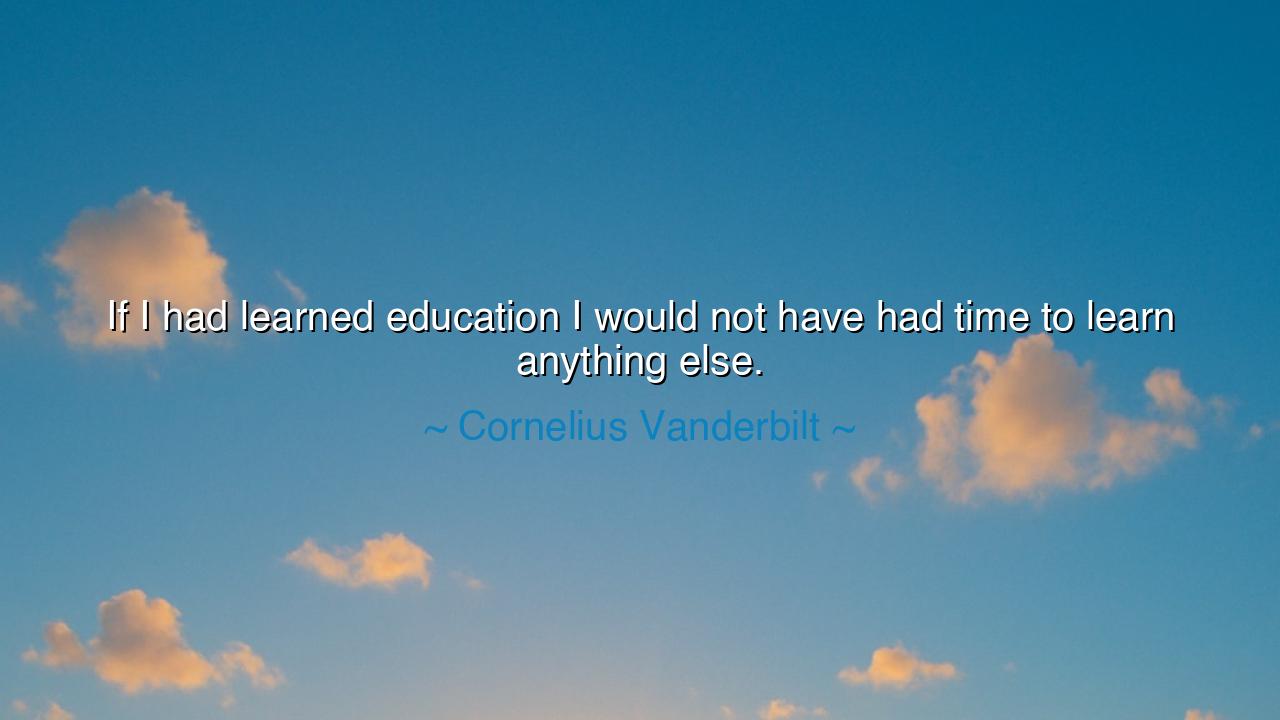
If I had learned education I would not have had time to learn






"If I had learned education I would not have had time to learn anything else." These words, spoken by Cornelius Vanderbilt, the titan of American industry, ring with both humility and defiance. Born in poverty and raised with little formal schooling, Vanderbilt rose to become one of the wealthiest men in history, a self-made empire builder who commanded fleets, railways, and fortunes. His words are not a scorn of knowledge, but a declaration of faith in the school of life—the kind of learning that comes not from books or teachers, but from sweat, failure, and intuition. To him, education was not something taught in classrooms, but something forged in experience.
To understand Vanderbilt’s meaning, we must remember the age in which he lived. The 19th century was an era of iron, steam, and restless ambition. America was being built by men who had no time for theory—they were too busy building the world itself. Vanderbilt, born in 1794, was not educated by professors, but by the sea and the wind, the markets and the docks. He began as a poor ferry operator on Staten Island, ferrying goods across the harbor for a few cents a trip. From that humble craft, he learned the laws of commerce, competition, and courage. These lessons—learned by doing, not by studying—became the foundation of his empire. When he said he had “no time to learn education,” he meant that his education was life itself, and that the discipline of experience was his greatest teacher.
There is in his words a challenge to conventional thinking—a reminder that formal education is not the only path to greatness. Many who have shaped the course of history walked a similar road. Thomas Edison, who invented the electric light, had only a few months of schooling before being expelled for being “too slow.” Henry Ford, who revolutionized manufacturing, learned not from textbooks but from disassembling machines by hand. Abraham Lincoln, though he became one of the most eloquent leaders of all time, learned to read and write alone by firelight. Vanderbilt’s declaration thus belongs to a long tradition of self-taught minds—those who understood that the most profound wisdom is not memorized but discovered.
Yet, the quote also carries a deeper truth about the nature of learning itself. True knowledge is not measured by diplomas, but by understanding, and understanding is born from curiosity, struggle, and perseverance. Formal education, if pursued without purpose, can become a cage—teaching rules without spirit, facts without meaning. Vanderbilt’s words remind us that education, when divorced from life, risks becoming sterile. It fills the mind but leaves the soul untouched. He sought not to mock learning, but to exalt experience as education, to remind future generations that wisdom grows from action, not only instruction.
In his world of ships and railroads, every decision carried risk. There was no teacher to guide him, only the harsh lessons of consequence. He made mistakes, endured failures, and faced ruin—but in each trial, he learned what no classroom could offer: resilience, intuition, and the courage to begin again. It was this education—hard, merciless, and priceless—that built the foundations of American enterprise. Thus, his quote becomes not a rejection of schooling, but an anthem for the self-made spirit, the eternal belief that life itself is the greatest university.
History shows that this kind of learning—the learning of necessity—has shaped many of humanity’s pioneers. The explorers who crossed oceans, the inventors who defied logic, the poets who spoke truth to kings—all learned not by sitting still, but by venturing forth. They risked failure and found wisdom in the wreckage. Vanderbilt’s sentiment echoes the wisdom of the ancients, who believed that knowledge gained by experience burns deeper into the soul than that acquired by mere study. Epictetus, the philosopher once a slave, taught that “only the educated are free”—but his education, like Vanderbilt’s, came not from classrooms but from endurance.
So, what then is the lesson for those who hear Vanderbilt’s words today? It is this: do not confuse education with schooling. True learning begins when one steps beyond the comfort of instruction and enters the living world. Whether you hold a degree or not, what defines your wisdom is how you live, how you fail, and how you rise. Read, yes—but also act. Observe, but also build. Let every challenge, every heartbreak, every victory become your teacher. For in the end, as Cornelius Vanderbilt reminds us, no man is uneducated who has learned from life itself.
And so, remember this teaching, passed down like a torch: seek not only to study the world, but to live it. Books will teach you the words of others, but experience will write your own. The mind that learns only from others repeats history; the mind that learns from life creates it anew. Therefore, cherish knowledge, but never let it replace the daring to act. For wisdom, as Vanderbilt proved, belongs not to those who memorize the lessons of others—but to those brave enough to learn from the world itself.






AAdministratorAdministrator
Welcome, honored guests. Please leave a comment, we will respond soon